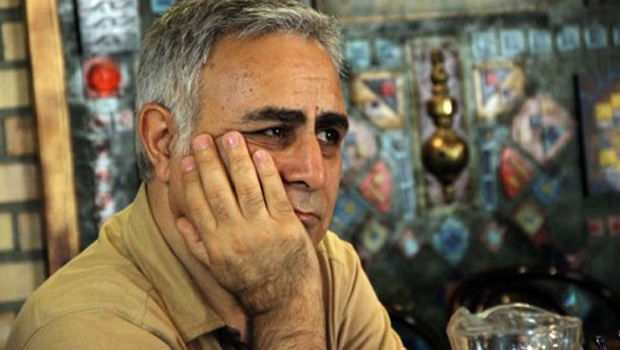
Hossein Sanapour was born on March 20, 1960 in Tehran. A Natural Resources graduate from the University of Tehran, Sanapour started writing and publishing stories, film reviews, literary criticism and even some screenplays in early 1980s. He has been the art and literary editor of four periodicals and has been working as a journalist for seven years since 1993. He wrote his debut novella The Village Boys (1990) and Afsaneh and the Long Night (1992) for young adults. The Missing Half (1999), his breakthrough novel was awarded The Mehregan and Yalda Literay Awards and was reprinted fifteen times by 2007. You Come Desolate, nominee of Golshiri and Yalda Literary Awards, was also a bestseller and reprinted four times since its publication in 2003 until 2008. With Open Guard (2004) and The Dark Side of the Words (2005) are Sanapour’s collections of short stories the latter of which was awarded the Golshiri Literary Awards Prize of the year. Dark Silhouette of Palaces (2010), and Lips on a Blade (2011) are his latest novels. The prolific writer also has a poetry collection titled My List (2011) and three volumes on fiction and techniques of novel writing in his literary resume, which also includes The Choir of the Scribes (2001) – a collection of critical essays on Houshang Golshiri’s art of fiction. Sanapour’s list of favorite and recommended texts is full of contemporary Iranian novels and his choices reveal his thematic and stylistic preferences for social novel.
PARSAGON What are the top seven works of world literature that have had the deepest influence on your life and career?
- Christine and Kid by Houshang Golshiri,
- Prince Ehtejab by Houshang Golshiri,
- Fear and Trembling by Gholamhossein Sa’edi,
- The Mourners of Bayal by Gholamhossein Sa’edi,
- The Rooster by Ebrahim Golestan,
- The Sound and The Fury by William Faulkner, and finally:
- One Hundred Years of Solitude by Gabriel Garcia Marquez.
- The Rooster by Ebrahim Golestan,
- Horn by Peyman Hooshmandzadeh,
- Cymbal and Spruce by Mahnaz Karimi,
- The Scriveners’ Books by Abutorab Khosravi,
- A Tale of A City by Ahmad Mahmoud,
- The Well of Babel by Reza Ghassemi,
- Dark Silhouette of Palaces, a novel by myself!
Perhaps the best-known collection of Gholamhossein Sa’edi’s short stories, The Mourners of Bayal comprises eight interconnected stories, all of which revolve around the inescapable horrors of death, disease, drought, and famine in a fictitious village named Bayal. “The Cow,” a short story in this collection was made into a very successful black and white movie by Dariush Mehrjuyi in 1969. Read Mahyar Entezari’s note on the story collection here.
Shazdeh Ehtejab (or Prince Ehtejab), Houshang Golshiri’s magnum opus, is an account of one of the last remaining heirs of the Qajar royal family who is suffering from tuberculosis – which he knows is fatal. He spends his last days alone in the magnificent rooms of his wintry palace, from where he recollects the glory days of his ancestors as well as days of degradation. Among the latter are the gruesome manner in which his cruel grandfather murdered his mother and brother, and the way that he himself caused the death of his wife. The novel was luckily made into a 93-min Farsi movie by Bahman Farmanara in 1974.
A Tale of A City: Following Neighbors, this novel by Ahmad Mahmoud accounts the aftermath of the coup, that is exactly where the novel Neighbors ends. It is a socio-historical novel with an excellent portrait of the lower classes of society in that historical era. In The Story of a City, Khaled the same character of Neighbors is expelled to a city.
Horn: Narrated from the first-person point of view, Peyman Hooshmandzadeh’s Horn presents a different experience of the imposed war: two soldiers, left all alone, find extreme pleasure in fancying the owner of the female voice of the enemy they hear over the wireless set and imagine the world of the soft gender. The soldiers in the 14 short stories of this collection are not the typical Holy Defense warriors. They are indifferent to their military service and the sacred defense discourse and instead, make dirty jokes on women to let time pass easier for them.


Leave a Reply